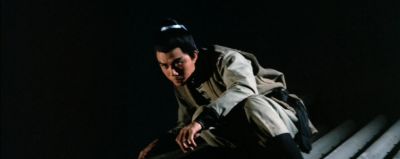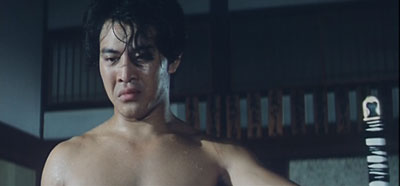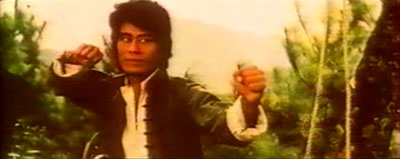| # A B C D E F G H I J K L M N O P Q R S T U V W X Y Z |
| Page 01 | Page 02 | Page 03 | Page 04 | Page 05 | Page 06 | Page 07 |
| Iron Bodyguard (1973, Chang Cheh & Pao Hsueh-Li) |
Big Blade Wang Wu (Chen Kuan-Tai) and patriotic scholar Tan Si-Tong (Yueh Hua) join forces to try and change a corrupt government but as expected it comes with its share of loss and Qing dynasty heroic bloodshed. Refreshingly straightforward and short coming from Chang Cheh and Pao Hsueh-Li (one of many co-directing ventures with Chang Cheh for the former cinematographer), Iron Bodyguard isn't designed as an epic character piece but definitely comes with a conscious thought of putting striking presence up front. The pairing of Chen Kuan-Tai and Yueh Hua is a good one, a leap off point for Chang Cheh's themes of brotherhood, patriotism and it's an effective little and very active tale covering these matters. Of course nothing without its action, by 1973 swordplay wasn't in vogue but rather kung-fu was and despite Wang Wu's weapon of choice being a big blade, the choreography (by the regular duo Lau Kar-Leung and Tong Gaai) leans more towards loud and powerful kung fu. There's no better to have present than Chen Kuan-Tai then and with a very admirable fluidity within these gritty brawls, Iron Bodyguard is a fine achievement in the name of furthering a market-trend. The expected production standard coming from Shaw Brothers is part of the checklist, with an impressively big brawl mid movie showcasing this for widescreen very well. Also starring Danny Lee, Lily Li, Lu Ti and Tung Lin. Sammo Hung tapped into the same story and expanded the background for Wang Wu in his 1993 film Blade Of Fury. |
| The Iron Buddha (1970) Directed by: Yan Jun |
With a terrific villain in the form of Wong Chung-Shun that effectively becomes the audience's public enemy number one after an attempted rape of a mute and a major hack and slash massacre on an entire clan, this basic revenge tale scores points for violent effect even if its stagey nature prevents the true, primal intensity to come out. Playing a little with story conventions as the only survivor played by Ling Yun seems to be heading to the final conclusion of it all way before the hour mark thanks to the character being supremely effective of taking out everyone, director Yan Jun cleverly injects notions of him being rash and easily deceived so there will be stumbling blocks. Plus only one weapon can defeat Wong Chung-Shun's Xian Tianzun and a kooky old master may or may not know of its whereabouts. Very violent but not leading the way in terms of action at Shaw Brothers, the multiple and quite epic scenes of massacre and bloodbath is usually quite stagey but the finale features admirable and intense sword exchanges and enhanced techniques for the fantastique universe The Iron Buddha belongs to. It may not be high profile but it's effective and goes against our expectations ever so slightly which triggers sustained interest in this talky but basic premise. Chen Hung Lieh and Fan Mei Sheng also appear. |
| Iron Fisted Eagle's Claw (1979) Directed by: To Lo-Po |
Chi Kuan-Chun and Bruce Leung plays two martial artists getting by performing demonstrations in the streets. They walk into a town run with an iron fist (or eagle's claw) by Chen Sing's Tiger and when the local militia leader is presumed dead, the two steps into his shoes... in comedic fashion. The interplay between the leads is at first fairly energetic but the effect becomes tiring quickly. Especially so since Leung is extremely broad and clownish. Iron Fisted Eagle's Claw really doesn't stand much of a chance to matter because of this in addition to an extremely low budget but it comes through action-wise. At first the choreography tends to be slow despite the detailed, complex movements but whenever Chi Kuan-Chun and Leung are involved, speed and intricacy is put into a somewhat higher gear. Best showcased during the ferocious finale with the two fighting Chen Sing. |
| Iron Man (1973) Directed by: Joseph Kuo |
Also known as Chinese Iron Man, Joseph Kuo doesn't complicate matters in this Fist Of Fury-like (very alike) basher where the evil Japanese and Chinese (the little, common man) clash. Main character Liang Hsiao Hu (Man Kong-Leung) is fed up with the Japanese hassling the staff at the local restaurant where he's the cook and proceeds to beat them up with a bit of Chinese fury. Now hunted, the clash also comes down to which martial arts school is the strongest, leading to a reel structured around the good ol' tournament fight... Low budget and lacking care in the period detail (the police uniforms doesn't exactly fit the 1920-30s period the movie is set in), Kuo instead is content to let his action team loose in multiple, long scenes relying more on bashing than techniques. It's a bit draining but overall effectively furious as the story dictates. |
| Iron Mistress (1969) Directed by: Sung Chuen-Sau |
The mix of a rebel fighting against oppressors-story gets for at least a few reels a character spin worthy of admiration. Sung Chuen-Sau, director of Brigitte Lin's debut movie Outside The Window, adheres to genre staples technically by having classical Chinese instruments on the soundtrack to add beats to the action (which is intense and often excellent for 1969). Also showcasing a well-directed and shot movie, the best stretch comes during a story-strand where Iron Lady (Han Hsiang-Chin) is contemplating how she and others around her should should firmly decide upon issues of a common life. Essentially, how to choose a man, even under these circumstances. Combine it with an atmospheric attack on their camp and you have a standout movie that unfortunately doesn't live up to this potential as it rolls along. Dealing with possible alliances, betrayal etc, it may culminate in a fine finale but it's also downright confusing to follow to an extent that hurt matters enough. Partially successful doesn't in this case get you a higher score. Also starring King Hu regular Pai Ying. |
| The Iron Monkey (1977) Directed by: Chen Kuan-Tai |
And why should you sometimes even attempt to reinvent the wheel? Chen Kuan-Tai proves this as the setup of eeeeevil Ching's taking out his family leading to Shaolin temple training and working for the enemy in order to get revenge is strong for a couple of distinct things that can sit proudly to the action. We know the Ching's were evil but playing up this fact neatly via a gritty and more bleak world than usual (plus the casting of Wilson Tong and Leung Kar-Yan helps) aids the vision of revenge reflected in the action. Being highly iconic and able himself, Chen Kuan-Tai escalates the fury nicely throughout where revenge is akin to animalistic violence and as ordinary as the vision in The Iron Monkey feels, it's also highly honed and worthy of its praise from the fan community. |
| Iron Monkey (1993, Yuen Woo-Ping) |
The wave of kung fu and swordplay of the 90s was always better when some of the originators or makers of the better ones got together so the mix of Yuen Woo-Ping, Tsui Hark, Donnie Yen and the Wong Fei Hung moviemaking legacy that exists between them dating back to the 70s equals a professionalism that elevates Iron Monkey. Yen plays the father of Wong Fei-Hung, Wong Kei-Ying who is forced to bring the mysterious 'Robin Hood' of the city dubbed the Iron Monkey (Yu Rong-Guang) to justice in order to get his son back from the governor (James Wong). Along the way he finds out things are not as clear cut as they seem and justice needs to be served by teaming up WITH Iron Monkey. A smaller story in feel versus Once Upon A Time In China, Yuen Woo-Ping still brings a sense of elegance and style to the proceedings. With one of the eyes capturing this being Arthur Wong, it's no wonder technical quality is solid throughout. Far from a Hong Kong quickie therefore but also not a massive social statement, the predicament for Donnie Yen's character is engaging enough, there's no subtlety as government officials are depicted as either clueless or ruthless but it rarely verges on taking a left turn mood-wise into clownish territory. A dress up sequence with Yu Rong-Guang and Jean Wang comes dangerously close but game actors and an amusing tone keeps the movie on track. While noticeably undercranked in spots, the action courtesy of Yuen Woo-Ping's brothers Yuen Cheung-Yan and Yuen Shun-Yi (also a supporting actor in the film) mixes grounded exchanges and the wire assisted choreography looks focused and fresh considering it's the busy 90s containing a lot of similar in style choreography across tons of productions. Of note is how the Yuen's uses wired up objects, the impact of the character's powers and a creative two on one fight on burning poles is a standout. Little Wong Fei-Hung is played by Angie Tsang, Jean Wang gets a more favourable showcase versus how she was shoehorned into the Once Upon A Time In China-series when that reached part 4 and Yen Shi-Kwan makes for a fun villain of considerable power. |
| Iron Ox, The Tiger's Killer (1974) Directed by: Tien Han |
"Blessed" with the revenge template, this made in Taiwan martial arts production looks, feels and is crummy but possesses some interesting narrative touches and quality fighting nonetheless. Wong Goon-Hung is the student out for revenge (and prior out for control of the province) so in his anti-hero ways he seeks out all men potentially responsible. One confrontation has him betting his blood and life so it's asides like this that makes one raise eyebrows. All is a backdrop for excessive fighting though and despite no true variation being evident (i.e. swingy arms and kicking), the length of each fight is welcome as it's totally ferocious and intense. This is fighting, not ballet and having the action for instance take place on a moving cart, on a collapsing roof and amongst farm animals adds excitement to what shouldn't have been approached as a standout. When all bashing is said and done, Iron Ox, The Tiger's Killer is. |
| Ironside 426 (1977) Directed by: Lam Kwok-Cheung |
Jason Pai goes undercover in the triads, rises through the ranks and initiates romance so the mission becomes too personal. Opening strong with violence and exploitation elements, the urban street level is compelling but story interest is low and standard story developments along the way (gang rivalry, fights etc) makes this an early but not essential undercover story. Man On The Brink and City On Fire took care of that need instead. Lam Kwkok-Cheung also helmed Enter The Game Of Death and Mr. Big (also starring Pai). |
| The Island (1985) Directed by: Leung Po-Chi |
D & B produced this tale of island terror with Leung Po-Chi at the helm. John Shum leads an expedition to an supposedly deserted island only to find out that it's inhabited by a group of seriously demented characters, lead by Peter Chan Lung. This is a family that stays together, slays together and when the youngest one is refused in marriage to one of the young girls of the troupe, they turn into axe-wielding maniacs together. Clearly inspired by The Texas Chainsaw Massacre or rather it needs to be since D & B weren't providing a large budget, Po Chih-Lung does sporadically well for himself in capturing the dirty and rundown nature of the island. The cinematography offers up some striking images from time to time but the first hour isn't an easy one to get through. Firstly, it does what Dennis Yu's The Beasts did wrong a few years before. Namely that of portraying the murderous island inhabitants in the most outrageous ways possible. That choice quickly destroys any notion of shock or terror and one wonders if this is comedic relief, in a twisted way. Hong Kong filmmakers often seems desperate to include laughs whenever they can so it's not a far fetched notion. Leung Po-Chi also pads out the various encounters with the freaky family way too long and it's not until the hour mark that the horror truly begins. Po hits a decent stride that includes effective detours into violence where the effect is of importance, not the special effect. Now if those pesky villains actually had been a disturbing bunch, The Island could've emerged out as something more substantial. Today, it stands as a passable diversion for those seeking out straight faced Hong Kong horror. John Shum anchors the movie surprisingly well, going from suitably geeky to not so much a superhero but a protector of these youths. One of the more believable aspects of Leung Po-Chi's film. Sadly, it is a definite step-down and disappointment considering Po the year before directed the award winning drama Hong Kong 1941, starring Chow Yun-Fat. Buy the DVD at: |
| Page 01 | Page 02 | Page 03 | Page 04 | Page 05 | Page 06 | Page 07 |
| BACK TO TOP |









